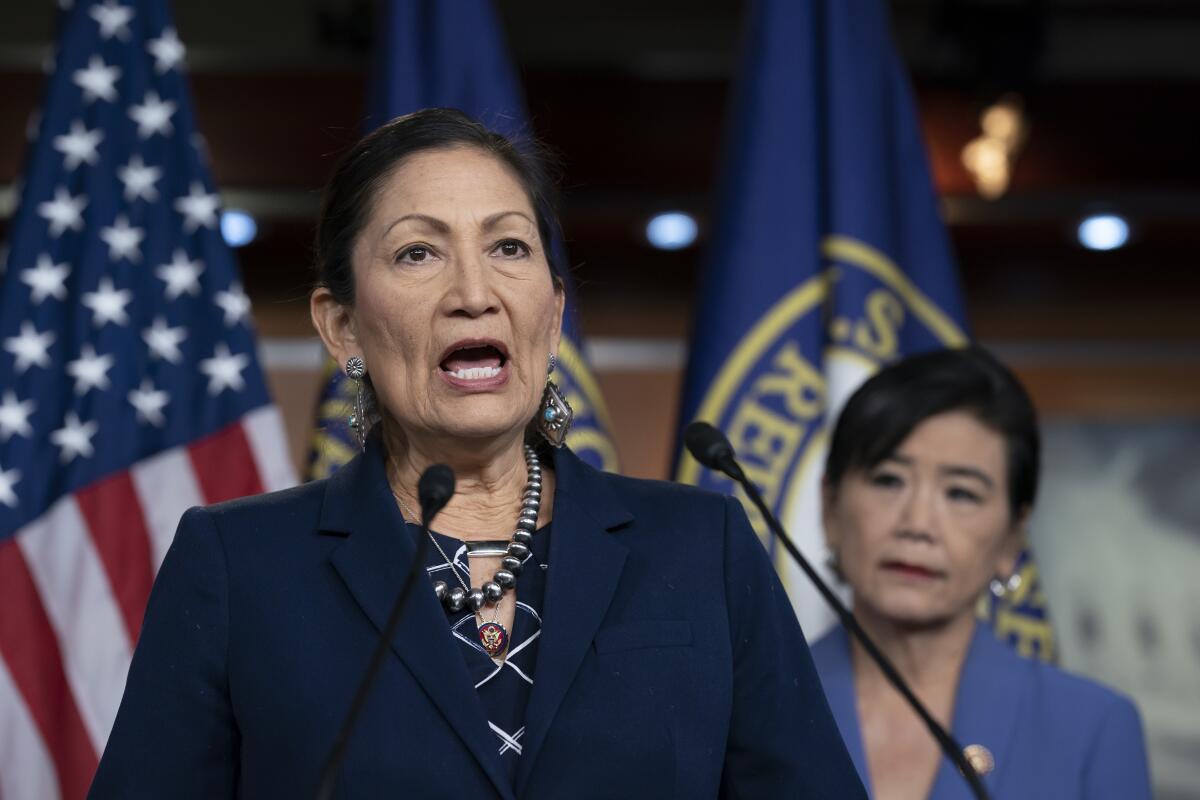Biden nominates Rep. Haaland to Interior, naming first Native American Cabinet member

- Share via
President-elect Joe Biden will nominate Deb Haaland, the freshman representative from New Mexico, to lead the Interior Department, making history by selecting the first Native American to oversee the agency that manages millions of acres of federal land and the Bureau of Indian Affairs, according to a person familiar with the decision.
If confirmed by the Senate, Haaland will take over a department mired in controversy over the Trump administration’s campaign to open up sensitive land and offshore areas to oil and gas development. She will also be responsible for implementing Biden’s promise to end oil and gas leasing on land controlled by the federal government — a move certain to face backlash from oil-dependent states, including her own, and lawsuits from the fossil fuel industry.
Because most drilling in the United States takes place on private land, it’s unlikely that this push would affect major oil and gas states like Pennsylvania and Texas. But it would have a significant impact on New Mexico, where one of the country’s largest oil booms on federal land has brought jobs and tax revenue to one of its poorest states. The state is expected to ask for a waiver exempting it from a drilling ban.
She will also oversee plans to restore the Bears Ears and Grand Staircase-Escalante national monuments in Utah to their original size, before President Trump greatly reduced them, and to reinstate protections against oil and gas extraction, mining and logging. And she will be in charge of the incoming administration’s efforts to prevent oil and gas leasing in Alaska’s Arctic National Wildlife Refuge, which the Trump administration is racing to carry out before the inauguration Jan. 20.
Federal judges have already suspended or voided hundreds of leases issued under Trump, finding that the Interior Department’s Bureau of Land Management made procedural mistakes and violated environmental laws in its haste to increase domestic oil and gas production. Even if the new administration is unable to overturn leases sold in the final months of Trump’s presidency, the courts could still reject them.
Tribal officials, environmental advocates and many Democrats cheered the news of Haaland’s expected nomination.
“After four years of fossil fuel executives and lobbyists opening up Native lands and sacred sites to industry tycoons, the next secretary of Interior will be a Laguna Pueblo woman who went to Standing Rock in 2016 and cooked for the people,” tweeted Julian Brave Noisecat, a Native American activist who promoted Haaland for the job, referring to protests against an oil pipeline through the Standing Rock Indian Reservation in North Dakota. “She’s going to make our ancestors so proud.”
New Mexico Sen. Tom Udall, another Democrat who was a top contender to lead the agency, which his father Stewart headed in the Kennedy and Johnson administrations, released a statement calling Haaland an “outstanding leader” who would “undo the damage of the Trump administration.”
The American Petroleum Institute, the oil industry’s principle trade organization, is all but certain to vigorously resist any interruption to more drilling. Nonetheless, the group issued a conciliatory statement, saying it would work with Biden’s environmental policy nominees to address climate change.
For Biden and his transition team, the selection of the next Interior secretary has been full of political minefields.
When news broke that the president-elect had offered the job to New Mexico Gov. Michelle Lujan Grisham, and that she had turned him down, Haaland’s allies were disappointed and Latino leaders complained that Lujan Grisham hadn’t been chosen for a different job: Health and Human Services secretary.
Early on, Native Americans and progressives in Washington pushed Biden to make history by nominating a Native American to lead the Interior Department. They coalesced around Haaland, a citizen of the Laguna Pueblo who, along with Sharice Davids of Kansas, became the first Indigenous women elected to Congress in 2018.
Haaland has served on the House Natural Resources Committee, which oversees the Interior Department, for two years. But some Biden advisors worried that she didn’t have enough experience to lead the agency that controls roughly 500 million acres of land across United States — about one-fifth of the nation.
Other Democrats were worried about appointing a current Democratic member of Congress, narrowing the party’s slim majority in the chamber, which was reduced significantly by election losses last month.
For so-called movement progressives on the Democratic Party’s left, Haaland is the first of their number to be tapped for Biden’s Cabinet. Allies worked to counter the argument that taking her from the House would put a Democratic seat in danger, pointing to evidence of her district’s increasingly blue tilt. The liberal website DailyKos calculated that Biden overwhelmingly won in Haaland’s district, 60%-37%, compared with Hillary Clinton’s 52%-35% edge in 2016. Haaland won reelection 58%-42%.
House Speaker Nancy Pelosi of San Francisco appeared to give Biden the green light earlier this week when she released a statement praising Haaland as a possible nominee to lead Interior.
“Congresswoman Haaland knows the territory, and if she is the President-elect’s choice for Interior Secretary, then he will have made an excellent choice,” Pelosi said.
More to Read
Sign up for Essential California
The most important California stories and recommendations in your inbox every morning.
You may occasionally receive promotional content from the Los Angeles Times.











